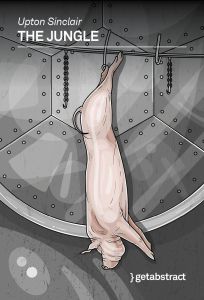
The Jungle
- Documentary Literature
- Realism
What It’s About
A Gut-Wrenching Tale of Degradation and Disillusionment
Upton Sinclair’s novel The Jungle shocked respectable Americans in 1906. Repeated economic crises punctuated rapidly growing industrial output, casting millions of people out of work and onto the streets. Conventional thinking was that these events were transient phenomena and that hard work and clean living would deliver individual prosperity in time. Many Americans saw slums, vice and squalor as signs of individual shortcomings – nothing more than new immigrants bringing bad habits and poor discipline with them from the old countries. The Jungle turned that way of thinking on its head. The economic system Sinclair portrayed took decent hard-working immigrants, stripped them of their savings, health, dignity and frequently their lives, in pursuit of shoddy, unsafe consumer products. It rewarded crime and political corruption, while crushing anyone foolish enough to demand fair treatment and a decent life. Unfortunately, Sinclair’s exposé of meat processing conditions in Chicago was the only part of his novel to truly upset respectable Americans’ stomachs. Food safety standards raised quickly, but improving working conditions would take decades longer. More than one hundred years on, the same questions of food quality and exploitation of the many for the benefit of a few once again resonate in debates on inequality, processed foods and pesticide residues.
Summary
About the Author
Upton Sinclair was born on September 20, 1878, in Baltimore, Maryland. His father, a liquor salesman, was an alcoholic, his mother a strict Episcopalian who preached abstinence. He was an only child growing up in poverty, but his maternal grandparents were very wealthy. He often stayed with them, learning first-hand what it meant to be rich and poor. While despising his father’s addiction, he equally abhorred his mother’s puritanism. At age 14, he entered the City College of New York and later Columbia University, funding his education by writing dime novels and articles for pulp magazines. At age 22 he married Meta Fuller, who was three years his junior. She gave birth to their son David in 1901. Yet his married life was a mess, and the couple separated years later. After several unsuccessful attempts of writing serious literature, Sinclair spent several weeks working in Chicago slaughterhouses in 1904, gathering material for the muckraking novel The Jungle (1906). This proved to be his literary breakthrough, and he used half of the profits to found the socialist-utopian creative community – yet non-Jewish, white-only – Helicon Home Colony in New Jersey. The idea was to engage in communal cooking and cooperative care for children, but after just six months, the place burnt down to the ground. With his second wife Mary Craig Kimbrough he moved to California in the 1920s, where he ran unsuccessfully for several political offices on the socialist ticket. In 1927, he published the novel Oil! in the midst of the Great Depression. In 1934, Sinclair ran as a Democrat for the Californian governorship, on a platform called End Poverty in California (EPIC), but, after a venomous smear campaign against him, the incumbent defeated him. Six years later, with World’s End (1940) he started a successful series and won the Pulitzer Prize for the third volume Dragon’s Teeth (1942) in 1943. Prominent writers like George Bernard Shaw suggested him for the Nobel Prize in Literature due to his political activism. A prolific writer throughout his life – he had more than 100 works of fiction and non-fiction to his name – he died on November 25, 1968, at the ripe old age of 90 in New Jersey.








Comment on this summary